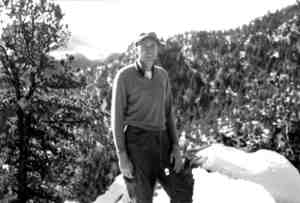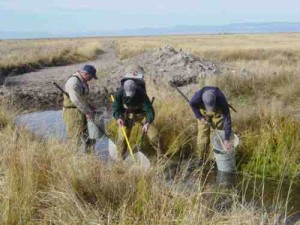Column by George Sibley
Agriculture – May 2007 – Colorado Central Magazine
I GUESS I’M FINALLY BEGINNING the transition to agri-culture. I don’t see how we’re going to be able to avoid it this century. But it’s not an easy transition for those of us who’ve been clinging to our hunter-gatherer past, high-grading the planet for its easy pickings.
My transition began here in the Upper Gunnison valley where I’ve been furthering my education at Western State College. I’m of that privileged part of the college that gets paid to keep learning, rather than paying; and my education in agri-culture is happening thanks to a band of students who wanted to start a campus community garden. They’re mostly science or Environmental Studies majors, and mostly dreadlocked — lean ethereal gossamer-bearded boys, and tiny lovely earth-girls who look like elfish folk out of Yeats’s Celtic twilight.
Campus rules decreed that they needed a faculty adviser to do this, or anything, on campus — one of the ways faculty keep themselves essential to students. All they really needed was an affordable (free) piece of earth to work, but a faculty front person was necessary for that, if Western’s acres of pretty bluegrass lawn were to be disrupted with something like food production.
They came to me because I have a reputation for being a sucker for fronting students who are designing a learning experience outside the standard curriculum. But I said yes to this bunch mostly because my own thinking has been going in parallel, if slightly darker, directions. I’d been reading quite a bit about “peak oil,” “Hubbert’s curve,” the collapse of civilizations and other gloomy discourses about the inevitable, maybe imminent, end of this great final flare of the long hunter-gatherer age of the human species.
We tell ourselves in the history books and other myths of the species that we became agricultural societies several thousand years ago, when we came down into the big fertile floodplains of the earth — the Nile, the crescent between the Tigris and the Euphrates, the Ganges, the Yalu, the Ohio and Colorado — and started large-scale organized food production. The big step in what the mythographers like to call “the ascent of man.”
But if we take a closer and more skeptical look at what has been happening during the last several thousand years, we can see it’s mostly that we’ve been forced, by our own success, into planting and herding — and how hard (and successfully) the hunter side of our hunter-gatherer soul has fought that.
We became homo sapiens sapiens, developing the big brains, precarious uprightness and adept hands, while we were spreading out over the earth, gathering up the bounty thereof. It wasn’t any life of luxury; we were (still are) at the mercy of the climate and other natural forces; but compared to most of our working lives today, it was an easier life . Anthropologists estimate that our early ancestors put in maybe four to six hours of actual work per day on average, with some really busy days — like when you got the woolly mammoth down and had to take care of the meat or when the piñon nuts were ready. But there were also a lot of post-feast days of loafing and feeding the soul, telling stories, experimenting in fermentation and remedies, imagining gods or thinking of sex.
THAT’S WHO AND WHAT we really are — a bright restless species looking here, there and everywhere for ways to get what we need with the least expenditure of personal energy. But we became so successful at this that our success — as measured in ever larger, ever healthier numbers — began to threaten that whole lovely way of life. In many places, humans succeeded to the point that groups began encroaching on each other’s turf. The gatherers who understood plants began collecting seeds and planting them in places easier to protect from encroaching foragers. Hunters who had followed the herds of herbivores, culling the weak and sick, had to become “herders,” protecting “their” herd from other humans as well as other predators. Anthropologist Steven LeBlanc revealed that warfare of a nasty “take no prisoners” sort erupted among hunter-gathers in our own Southwest after all of the regional groups settled into a more sedentary village-based culture. Until then, they had left each other alone.
Settlement, of course, led to whole new sets of necessary adaptations — sanitation, pest control, and all of the other nuisances we had always just moved on ahead of. But the biggest adaptation of all, for those more inclined toward the excitement of the hunt than the more dependable trudge of the forage, was developing a social and economic order that let them share in the bounty of the harvest without having to bust their backs in the field.
Thus were born the managerial and professional classes and other cultural aristocrats. It may have been a shorter step from the early priestcraft to modern investment bankers than it was from the earlier shaman or “big man” of the nomadic band to the civilized priestcraft. But the intent and effect was the same: how to carry forward that great old Edenic ethos of high-grading the planet of its low-hanging fruit with minimal effort.
It’s fair to observe that many of the aristocratic “crafts,” which evolved to escape the fields, involve every bit as much work as farming and maybe more stress. But the high-grading culture honors their work more and pays it better than the basic work of agri-culture. This appreciation led to more effective high-grading efforts, especially after expanding surpluses (as the high-grading mentality seeped into the agri-culture, shifting it toward food-mining) enabled the maintenance of an army for “preemptive defense” in the necessary expansion of the state’s area of control. Think Iraq, where what the Sumerians and Assyrians sent around is once more coming around.
No so-called “agricultural civilization” has ever done a better job than Europeans and Americans at freeing up the majority of people from the essential work of food production. Less than a twentieth of Americans and Europeans take care of all of that for us. But we are coming inexorably closer to the unavoidable confrontation with the reality that we still try to avoid, and that’s the fact that all we have has been enabled by the ultimate high-grade: the profligate use of fossil fuels to replace muscle power throughout the culture.
PETROLEUM, ESPECIALLY, fulfills that old hunter-gatherer’s wet dream of energy that comes spurting out of the ground by supplying a hundred to two hundred units of energy for every unit of energy expended to get it. And even now, with pumping required, it’s still coming at 20-25 units of energy for every unit expended (discounting externalities), which lets twenty live off the labors of one. But the surplus wealth to which we’ve become accustomed has to be borrowed from the future.
We try to kid ourselves that there will be other “easy energies” out there. And who knows, maybe it really is all run by a jealous god who favors Abel’s hunter-herder meat over Cain’s vegetables; maybe god will in fact provide. But everything we are looking at now — nuclear, shale oil and gas, tar sands, coal and its gas potential, biofuels, solar, wind — they all have energy-gained-for-energy-invested ratios of less than 5-1, and some of them (biofuels) are closer to 1-1. You get out what you put in, which is a lot like muscle power.
So that’s what I was thinking about when these serious students said they wanted to start a campus garden group, and offered convincing philosophical arguments that resonated with what I’d been thinking. After two to three years of education at a standard hunter-gatherer college (we just got two endowed chairs in petroleum geology) — and hearing the bad news coming in — they’ve decided to launch an agri-culture.
And they need a faculty adviser, which means I could just sort of supervise and consult for a share…. No, it may just be time to pick up a shovel. The Garden now is east of Eden — and is whatever we make it.
George Sibley is commencing his learning duties as he retires from his teaching duties at Western State College in Gunnison.



